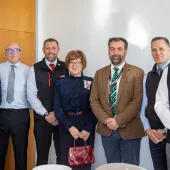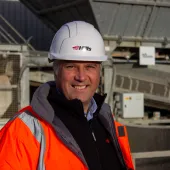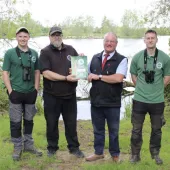Hills Group highlight health and safety success

Company marks European Week for Safety & Health as managers complete IOSH training
THE Hills Group marked this year’s European Week for Safety and Health (EWSH) – which ran from 21–26 October – by acknowledging six members of their senior management team (pictured) who have successfully completed and passed the Institution of Occupational Safety and Health (IOSH) ‘Managing safely’ course.
The EWSH ‘working together on risk management’ campaign focuses on managing risks, encouraging top managers to actively engage in risk reduction and encouraging workers and their representatives to work with managers to reduce risks.
‘We operate in three of the most statistically dangerous industries in the UK and as a result we take health and safety seriously,’ said chief executive Mike Hill.
‘Our good health and safety record speaks for itself and is one we are proud of, but whilst there is no room for complacency there is always room for improvement.’
The Hills Group’s operations cover waste management and recycling, quarrying and production of ready-mixed concrete, and building construction including new homes.
The IOSH ‘Managing safely’ course is a nationally recognized and respected certificate designed to give managers the knowledge and tools to handle health and safety issues. The course covers subjects such as: assessing and controlling risks; identifying hazards; investigating accidents and incidents; and protecting the environment.
Earlier this year the Group launched its ‘Year of Health and Safety’ initiative to highlight the importance of working in safe environments and reducing time off as a result of injury at work.
Focusing on the principles of strong management leadership combined with active worker participation, as specified by the EWSH, Hills have laid out specific targets to reduce the number of reported incidents during the year.
Employees throughout the company have been issued with ‘near-miss booklets’ to capture potential health and safety issues they come across whilst at work and report, to their manager, the action taken to immediately resolve the matter. Managers then follow up the reports with more permanent solutions.
Mike Hill said: ‘I am confident that we will achieve the target set. It is widely acknowledged that for every one accident there are 10 near misses. So improving our reporting of near misses and taking action to eliminate the risks should result in even fewer accidents.’









